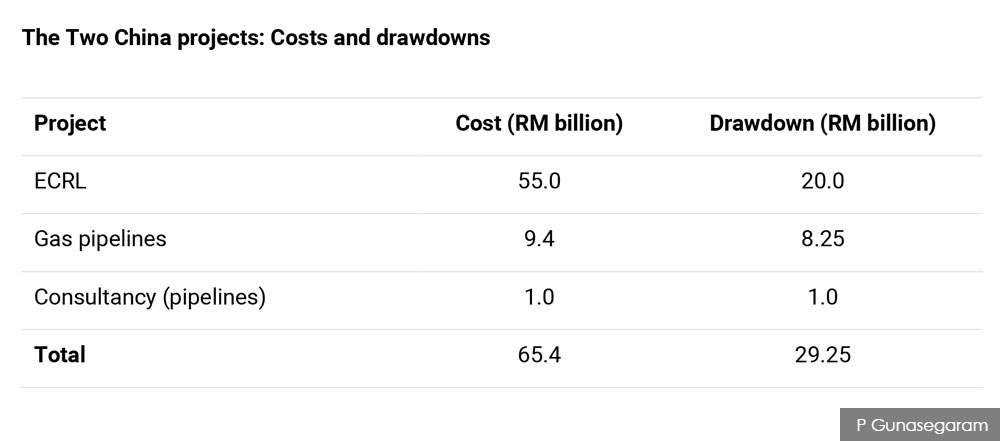QUESTION TIME | There are two aspects of China’s involvement in the 1MDB scandal.
First there is the question of money allegedly being channelled through China contracts to fill the asset hole of 1MDB – nearly RM30 billion from which is swirling in the global financial system – by substantially overpricing contracts and putting money into overseas accounts ahead of normal schedules.
Second is the possible harbouring of a key figure in the scandal, wanted businessman Low Taek Jho – a friend and associate of former prime minister Najib Abdul Razak, his wife Rosmah Mansor, and Najib’s stepson Riza Aziz.
In his visit to China, Prime Minister Dr Mahathir Mohamad had to tiptoe delicately around this issue of how the country was directly helping the previous government to move funds via various lopsided arrangements, avoiding all the time directly pointing his finger at it – something that Mahathir is not used to doing.
While he cancelled both the East Coast Rail Link (ECRL) project, costing RM55 billion at this stage, and some RM10 billion in pipeline contracts, he had nothing substantial to announce, barring the statement that their top leaders understood why we were not going ahead with the contracts.
If his mission to China was to solve this issue of overpriced contracts that we do not need, then his trip was an utter failure, for he had nothing to report in terms of any concessions they made – aside from the usual platitudes that China will buy more palm oil from us , and that we will ensure that their investors from the country will be treated fairly.
Exit strategy
Instead, Mahathir stuck closely to blaming the previous government for their “historic stupidity” in entering into the contracts in the first place. “We must find a way to exit this project (ECRL) and at the lowest cost possible, (and) we will have to pay compensation. But this is our own people's stupidity. We can’t blame the Chinese for that,” he said.
But this is more than stupidity. It is criminal, and instead of soft-pedalling, Mahathir may have to harden his stance against China if he wants to recover some of the money, for it is clear that the country was complicit in these money transfers.
Mahathir and Malaysia need to confront China because their complicity may well invalidate contract arrangements they had with the previous government. It involves a lot of money – a further RM30 billion, as I have explained here.
On the ECRL estimated to cost RM55 billion, Mahathir told The Edge in an interview soon after becoming prime minister that the loan for Malaysia to build the ECRL is being kept abroad, adding that this led to suspicions that some of the money was used to repay 1MDB debts and buy certain companies.
Quoting sources, The Edge reported that the cost of the ECRL project was inflated by about RM20 billion, in part to buy assets from 1MDB.
The ECRL was awarded to China state-owned company, China Communications Construction Company Ltd (CCCC). Out of the RM55 billion construction cost, 85 percent or nearly RM47 billion was to be financed by China.
Reports said payment was to be made directly to CCCC without the money coming into Malaysia according to schedule, which does not reflect payment on a percentage of completion basis. Apparently, RM20 billion had already been drawn down from the loan, but there is no clarity on where the money has gone.
On top of that, finance minister Lim Guan Eng revealed a new shocker in June: two pointless gas pipelines costing RM9.4 billion to be undertaken by Suria Strategic Energy Resources (SSER) – a wholly-owned Finance Ministry subsidiary set up specifically for the projects in 2016.
Despite only 13 percent completion, 88 percent of the project cost or RM8.25 billion had been paid. On top of this, consultancy fees totalling an outrageous RM1 billion was paid to two China companies.
The table below shows the breakdown for the ECRL and the gas pipeline projects.

These payments, resulting from the overpricing of the contracts, were apparently intended to buy 1MDB assets and therefore fill a hole there, giving the impression that everything was OK with the strategic development company. That would make China complicit.
If these amounts are not collected back, then the amount that the government might lose from 1MDB is not just the RM30 billion or so hole in the company alone, but also the RM30 billion contract overpricing, bringing the total to RM60 billion.
Harbouring a fugitive
China is further complicit if it is indeed harbouring Low, a fugitive who is wanted in connection with the billions embezzled from 1MDB, as reported by the Wall Street Journal.
In fact, this was supposed to be on the agenda for Mahathir’s China visit. The prime minister, however, had nothing to say about this apart from mentioning he would put handcuffs on Low if he met him.
So far, the soft-soft approach seems to have failed. If Mahathir wants to recover money from China and get Low back to face trial, he needs to up the ante and confront China over its complicity – if necessary, publicly.
China may be a superpower, but it cannot be allowed to get away with being complicit in criminal activities against us.
P GUNASEGARAM says we cannot let might be right but we need to pick our battles and alliances carefully to win the war. Email: [email protected]
The views expressed here are those of the author/contributor and do not necessarily represent the views of Malaysiakini.

